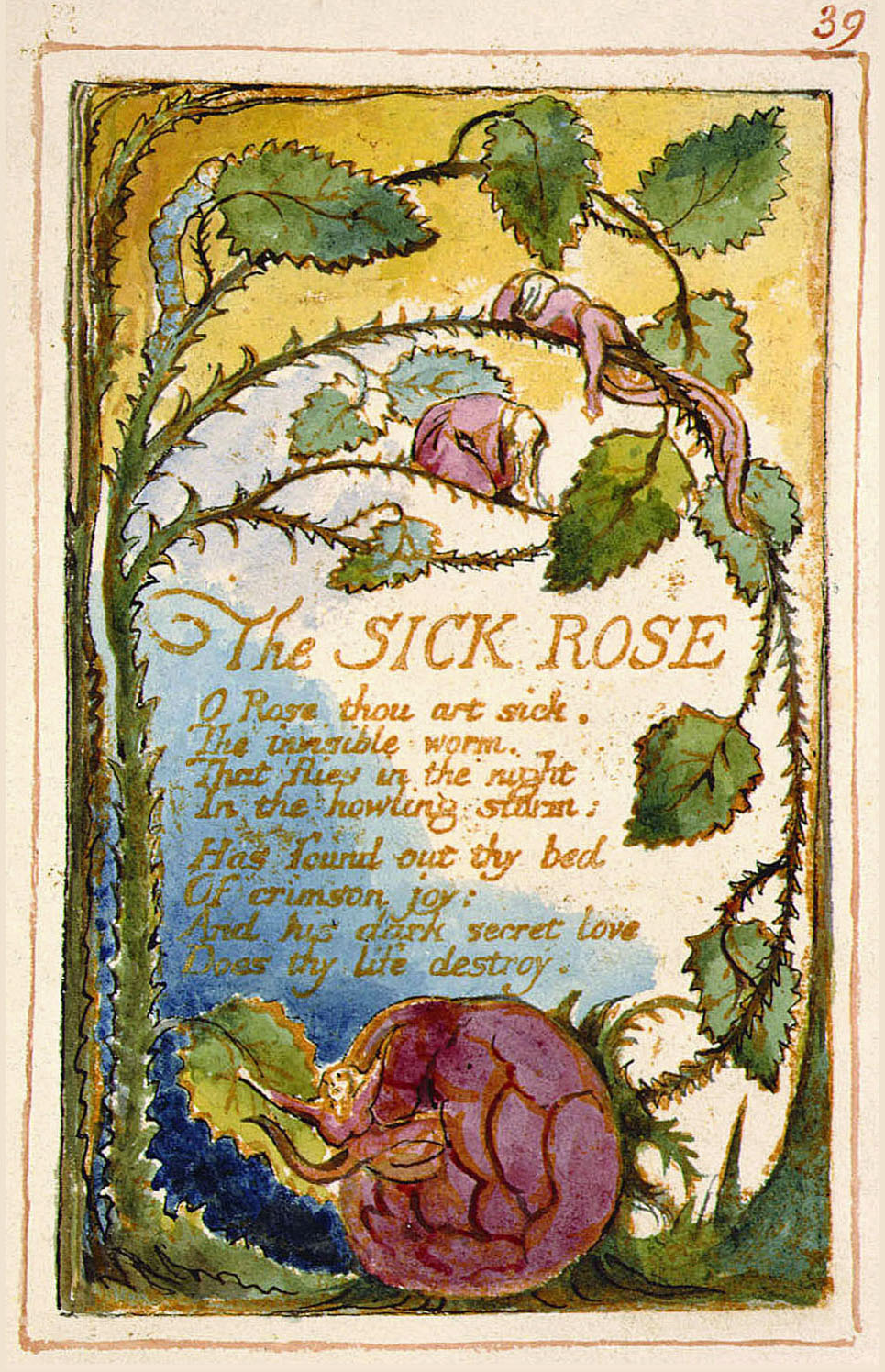Photo AI
Last Updated Sep 27, 2025
Songs of Experience: The Sick Rose by William Blake Simplified Revision Notes for A-Level AQA English Literature
Revision notes with simplified explanations to understand Songs of Experience: The Sick Rose by William Blake quickly and effectively.
372+ students studying
Songs of Experience: The Sick Rose by William Blake
Context
- "The Sick Rose" is part of William Blake's Songs of Experience, published in 1794.
- The poem reflects Blake's exploration of the darker aspects of human experience, contrasting with the innocence depicted in his Songs of Innocence.
- Blake was deeply engaged with the social and political issues of his time, often critiquing the corruption and hypocrisy he saw in institutions such as the church and state.
- The poem uses the image of a rose and a worm to convey themes of corruption, secrecy, and destruction, illustrating the transition from innocence to experience.

Structure and Form
- The poem consists of two quatrains.
- Each stanza follows an ABCB rhyme scheme.
- Written in simple, direct language, enhancing the poem's accessibility and emotional impact.
- The brevity and simplicity of the structure reflect the starkness and immediacy of the poem's themes.
Key Themes
Corruption and Decay
- "O Rose thou art sick. / The invisible worm"
- The rose symbolizes beauty and purity, while the worm represents corruption and decay.
- Blake uses this imagery to illustrate how innocence can be tainted by unseen forces.
Secrecy and Destruction
- "That flies in the night / In the howling storm:"
- The worm's actions are hidden and destructive, symbolizing secretive and harmful influences.
- Reflects Blake's critique of hidden corruption within society.
Love and Betrayal
- "Has found out thy bed / Of crimson joy:"
- The worm invading the rose's bed represents a betrayal of love and purity.
- The "crimson joy" suggests passion that has been corrupted.
Mortality and Suffering
- "And his dark secret love / Does thy life destroy."
- The destructive love of the worm leads to the rose's death, symbolizing how hidden forces can lead to suffering and mortality.
- Reflects the darker aspects of human experience and the inevitable loss of innocence.
Nature and the Unseen
- "The invisible worm"
- Emphasizes the presence of unseen forces in nature that can cause harm.
- Suggests that what is hidden or invisible can have a profound impact on life.
Similar Poems
- "Songs of Experience: The Tyger": Shares themes of innocence and experience, focusing on the complexity of creation and the nature of good and evil.
- "Songs of Experience: London": Explores themes of social critique and the harsh realities of urban life, focusing on the suffering caused by societal institutions.
- "Ode on Melancholy" by John Keats: Addresses themes of transience, beauty, and the interplay of joy and sorrow, reflecting the tension between innocence and experience.
- "Ode to the West Wind" by Percy Bysshe Shelley: Explores themes of transformation and change, reflecting on the power of nature and the potential for renewal in society.
Line by Line Analysis
Stanza 1
O Rose thou art sick. The invisible worm, That flies in the night In the howling storm:
"O Rose thou art sick."
- Begins with a direct and stark declaration, personifying the rose.
- "Sick" suggests a state of corruption or decay, contrasting with the typical image of a healthy, beautiful rose.
"The invisible worm,"
- Introduces the worm as the agent of corruption.
- "Invisible" implies hidden or secretive actions, enhancing the sense of insidiousness.
"That flies in the night / In the howling storm:"
- Describes the worm's nocturnal activity, associating it with darkness and turmoil.
- "Howling storm" creates an image of chaos and destruction, emphasizing the destructive nature of the worm.
Stanza 2
Has found out thy bed Of crimson joy: And his dark secret love Does thy life destroy.
"Has found out thy bed / Of crimson joy:"
- The worm has invaded the rose's intimate space, symbolizing a violation or betrayal.
- "Crimson joy" suggests passionate love that has been tainted by corruption.
"And his dark secret love / Does thy life destroy."
- The worm's secretive and destructive love leads to the rose's demise.
- "Dark secret love" implies a harmful and hidden force, emphasizing the theme of destruction through hidden corruption.
500K+ Students Use These Powerful Tools to Master Songs of Experience: The Sick Rose by William Blake For their A-Level Exams.
Enhance your understanding with flashcards, quizzes, and exams—designed to help you grasp key concepts, reinforce learning, and master any topic with confidence!
180 flashcards
Flashcards on Songs of Experience: The Sick Rose by William Blake
Revise key concepts with interactive flashcards.
Try English Literature Flashcards18 quizzes
Quizzes on Songs of Experience: The Sick Rose by William Blake
Test your knowledge with fun and engaging quizzes.
Try English Literature Quizzes28 questions
Exam questions on Songs of Experience: The Sick Rose by William Blake
Boost your confidence with real exam questions.
Try English Literature Questions27 exams created
Exam Builder on Songs of Experience: The Sick Rose by William Blake
Create custom exams across topics for better practice!
Try English Literature exam builder21 papers
Past Papers on Songs of Experience: The Sick Rose by William Blake
Practice past papers to reinforce exam experience.
Try English Literature Past PapersOther Revision Notes related to Songs of Experience: The Sick Rose by William Blake you should explore
Discover More Revision Notes Related to Songs of Experience: The Sick Rose by William Blake to Deepen Your Understanding and Improve Your Mastery
96%
114 rated
The Romantics
Songs of Innocence: Holy Thursday by William Blake
461+ studying
182KViews96%
114 rated
The Romantics
Songs of Experience: The Tyger by William Blake
220+ studying
183KViews96%
114 rated
The Romantics
Songs of Experience: London by William Blake
341+ studying
183KViews96%
114 rated
The Romantics
Lines Written in Early Spring by William Wordsworth
399+ studying
189KViews